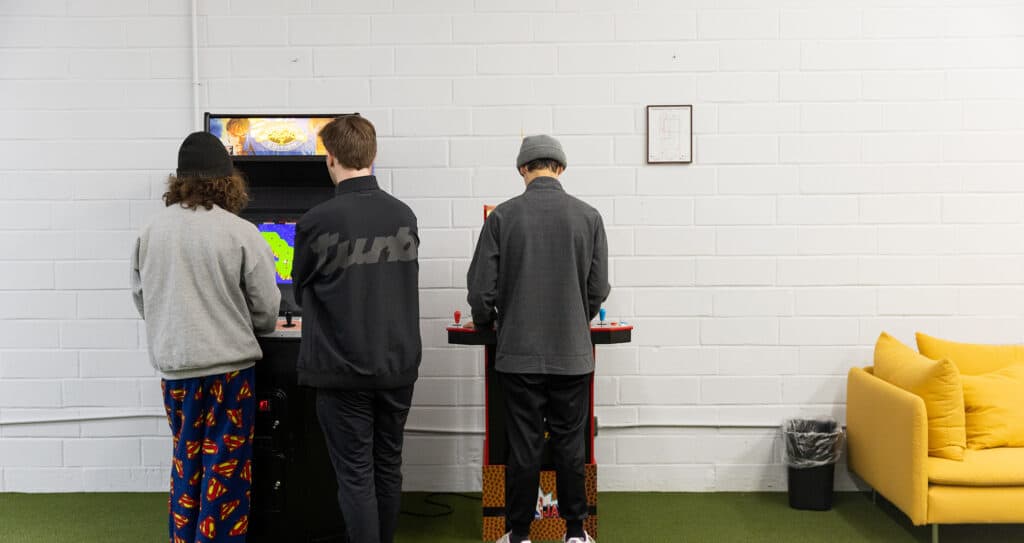When the feeling of anxiety is crippling and interfering with day-to-day activities, or if it doesn’t go away with time, then it could mean your child is suffering from an anxiety disorder.
Adolescent Anxiety Treatment
Every teen goes through ups and downs. A little stress from school or social situations is expected. But if your teen seems overwhelmed more often than not or avoids things they once enjoyed, there may be something deeper going on. What you’re seeing might be more than just stress. It could be an anxiety disorder that requires professional teenage anxiety treatment.
According to the Diagnostic and Statistical Manual of Mental Disorders (DSM-5), generalized anxiety disorder (GAD) is diagnosed when your child experiences excessive, hard-to-control worry on most days for at least six months. This type of anxiety often centers around school performance, health, friendships, or future concerns. When symptoms persist and interfere with daily functioning, structured adolescent or teenage anxiety treatment may be recommended.
Anxiety Symptoms in Teens
To meet the diagnostic criteria, your teen must also show at least three of the following anxiety symptoms:
- Feeling restless or constantly on edge
- Getting tired easily or having low energy
- Trouble focusing or feeling like their mind is blank
- Muscle tightness, aches, or tension
- Difficulty falling or staying asleep
These symptoms often accompany physical symptoms, such as stomachaches, headaches, a racing heart, or dizziness. Your teen might not always tell you what they’re feeling, but you might notice them pulling away from family or seeming anxious for no clear reason.

At Key Healthcare, we specialize in adolescent mental health and offer evidence-based treatments designed specifically for teens. With the right support, your teenager can regain a sense of control.
If you’ve been wondering whether what your teen is going through is normal, trust your instincts. You know your teenager best, and if something feels off, we’re here to help you treat anxiety with compassion and care.
How Common Are Anxiety Disorders in Teens?
If you’re worried that your teen may be dealing with anxiety, you’re not alone. According to the National Institute of Mental Health, nearly 1 in 3 adolescents in the U.S. has experienced an anxiety disorder at some point in their lives. That’s a staggering number, and it shows just how many families are quietly facing the same struggles you are right now.
And while these numbers are high, what’s even more concerning is this: According to the WHO, only about 1 in 4 people with anxiety receive treatment. That means most teens are silently dealing with these overwhelming emotions without the help they truly need. Often, it’s not because their families don’t care, it’s because they don’t realize how treatable anxiety is.
At Key Healthcare, we’re here to change that. We specialize in helping teens understand what they’re going through and begin to feel like themselves again with the support of professionals who truly care.

Help Your Teen Find Relief from Anxiety
If your teen is struggling with anxiety, Key Healthcare offers specialized treatment tailored to their unique needs. Our compassionate team provides evidence-based therapies and a supportive environment to help teens manage symptoms, build confidence, and regain control of their lives. Contact us today to learn more and start the healing journey.
What Causes Anxiety in Teenagers?
When your teen is overwhelmed, it’s natural to wonder what’s causing it. The truth is, there isn’t just one reason. A mix of biological, emotional, and environmental factors can shape anxiety. Understanding these causes can help you identify early warning signs and take the necessary steps to support your child before the situation worsens.
Brain Development and Hormones
During the teenage years, your child’s brain undergoes significant changes. The amygdala, which handles emotions like fear and worry, is especially active. Meanwhile, the prefrontal cortex, which plays a crucial role in decision-making and reasoning, continues to mature. This mismatch can make anxious feelings feel bigger and harder to control, even if they don’t fully understand why they feel that way.
Genetics and Family History
If anxiety, depression, or other mental health conditions run in your family, your teen may be more vulnerable. That doesn’t mean they’re destined to struggle, but it does mean you’ll want to be more mindful of the signs, so you can act early if needed.
Trauma and Stressful Situations
Big life changes or painful experiences like bullying, abuse, losing a loved one, or even moving to a new school can all become triggers for anxiety. These events can be traumatic and shake your teen’s sense of safety and stability, sometimes long after the situation has passed.
Medical Conditions
Sometimes, physical health can play a hidden role in anxiety. Thyroid issues, hormone imbalances, or even vitamin deficiencies may worsen symptoms. If your teen’s anxiety seems sudden or severe, it’s always worth checking in with a healthcare provider to rule out underlying medical conditions.
Environmental and Social Pressures
You’ve probably noticed the immense pressure that teens face today. From academic expectations to social media usage, peer comparison, and the fear of disappointing others, it’s a lot. These external pressures can easily turn into negative thoughts or self-doubt if your teen doesn’t have the right tools to cope.
Types of Anxiety Disorders in Children and Teens
Every teenager experiences fear or nervousness at times. But when those feelings start to take over your teenager’s day-to-day life, it could be a sign of something more serious. There are several types of anxiety disorders in children and teens, each with its own set of symptoms.
Generalized Anxiety Disorder (GAD)
If your teen seems to worry about everything from school performance and friendships to the future and things happening in the world, you’re likely seeing signs of generalized anxiety disorder. These worries may seem irrational to you, but they feel very real to them. You might notice physical symptoms like stomachaches, headaches, trouble sleeping, or just a constant sense that something’s wrong.
This type of anxiety isn’t always linked to any actual danger, but the emotional toll is very real. Left unaddressed, it can limit your teen’s ability to enjoy life or feel confident in everyday situations.
Social Anxiety Disorder
Teens with social anxiety disorder often feel like everyone is watching and judging them. They may dread raising their hand in class, attending social events, or even eating in front of others. This fear can grow into isolation and have lasting effects on self-esteem, especially in young people already struggling with body image or peer comparison.
Panic Disorder
Panic attacks can come on suddenly, sometimes with no warning. Your teen might describe it as feeling like they can’t breathe or like they’re losing control. These episodes often include symptoms like a racing heart, chest pain, sweating, and dizziness. When these attacks happen more than once, your teen may begin to worry constantly about the next one, what’s known as excessive worry, which becomes a cycle that’s hard to break without support.
Panic disorder is especially difficult because the fear of future attacks can lead teens to avoid situations altogether, limiting their ability to function normally in school or social life.
Separation Anxiety Disorder
You might think of separation anxiety as something that only affects younger children, but many teens feel intense distress when they’re away from home or the people they trust. They might resist going to school or experience overwhelming fear about something bad happening to you or themselves.
This can be incredibly tough for both you and your child, especially when you’re not sure how much is typical teen emotion and how much might signal an anxiety disorder that needs more help.
Obsessive-Compulsive Disorder (OCD)
Suppose your teen seems stuck in rituals, such as washing their hands repeatedly, checking things excessively, or counting objects before leaving a room. In that case, they may be exhibiting signs of Obsessive-Compulsive Disorder. These behaviors often stem from intrusive thoughts and a deep-seated need to prevent something bad from happening.
Though your teen might recognize these behaviors as irrational, the fear feels real and overwhelming. OCD often causes a high level of distress and can take over your teen’s daily routine.
Phobias and Agoraphobia
Some teens develop specific phobias, which are intense fears about particular objects or situations, such as spiders, flying, or medical procedures. Others may experience agoraphobia, which involves the fear of being in places where escape might be difficult. This could include crowded spaces like malls or even school hallways.
Over time, this fear may cause your teen to avoid more and more places until it becomes hard for them to leave home at all. If your child is avoiding everyday activities or places they once enjoyed, it’s a strong sign that it’s time to seek professional help.
While these conditions vary, they all share one thing: they can be incredibly overwhelming for your teen and deeply painful for you to watch. But with early recognition and evidence-based treatments, healing is possible.
Our goal in developing Key Healthcare was to create programs that gave teens the guidance they needed to draw on their strengths and realize their potential to live fulfilling happy lives. Based on our own experiences, we believe that everyone has the ability to change if given the proper structure and connection.

Ryan Blivas & Evan Powell
Founders of Key Healthcare
When to Seek Professional Help for Mental Health Care
Many parents wait, hoping things will improve on their own. But untreated anxiety can get worse over time. If you notice your teen struggling for more than a few weeks, or if they are experiencing suicidal thoughts, it’s time to seek help from a qualified mental health professional.
A Masters level therapist or psychiatrist will typically conduct a physical examination, review the patient’s family history, and conduct interviews to rule out other potential conditions. Anxiety cannot be diagnosed with a single test, but through a full assessment, an accurate diagnosis and treatment plan can be created.
You may feel nervous about this step, but providing your teen with the support they need can change their life.
Teenage Anxiety Treatment at Key Healthcare
Our teenage anxiety treatment programs are designed specifically for adolescents. We treat the whole person, not just the symptoms, with compassion and evidence-based care.
Teen Residential Treatment Program
In our 45 to 60-day residential program in Los Angeles, teens receive round-the-clock support in a safe, home-like environment.
Therapies include:
- Cognitive behavioral therapy (CBT) to challenge irrational thoughts
- Dialectical behavioral therapy (DBT) for emotional regulation
- Family therapy to improve communication and rebuild trust
- Art, music, and recreational therapy to heal through expression
Your teenager may also receive academic support to stay on track with school while they heal.
Partial Hospitalization Program (PHP)
Our PHP runs five days a week, eight hours a day. It’s ideal for teens who need intensive treatment but can return home in the evenings. Your teen will work on developing coping strategies and managing symptoms in a structured yet non-residential setting.
Intensive Outpatient Program (IOP)
The IOP offers nine hours of therapy per week and is designed for teens who are transitioning out of more intensive programs or need extra support while staying at home. This level of care teaches teens how to manage stress and maintain progress in real-world settings.
Dual Diagnosis Care for Substance Abuse
It’s common for teens with anxiety to turn to substances to cope. Our clinicians specialize in dual diagnosis care, addressing both anxiety and substance abuse at the same time. This ensures your teen not only recovers but also stays on the right path in the long term.
Support Beyond Therapy
We also teach teens relaxation techniques, healthy lifestyle habits, and self-care skills. Learning to reduce anxiety through breathwork, exercise, and sleep routines is a key part of lasting recovery.
Why Families Choose Key Healthcare for Adolescent Anxiety Treatment
When your child is struggling, you want a team that understands how to help, not just treat. At Key Healthcare, we specialize in adolescent psychiatry, trauma recovery, and dual diagnosis. We don’t just help teens cope. We help them grow.
From the first call to the final session, we partner with you and your teen every step of the way.
Our staff includes:
- Master level therapists and psychiatrists
- Academic coordinators to support school success
- Program mentors who inspire hope and healing
- Dedicated care coordinators to help your family navigate the process
Worried about costs? We’ve got you. Key Healthcare works with most major insurance providers, and up to 100% of treatment costs may be covered, depending on your plan.
It might feel like a big step, but remember why you're here—you’re looking for a way forward.
FAQ
What are some common symptoms of anxiety in teens?
Anxiety in teenagers doesn’t always look dramatic. Sometimes it shows up quietly. You may notice irritability, sleep problems, frequent headaches, stomach pain, or a sudden drop in grades. Some teens withdraw from friends. Others seem constantly tense or on edge. During more intense episodes, they might report chest tightness, dizziness, trembling, or racing thoughts.
When symptoms start interfering with school, relationships, or daily functioning, it may be time to consider professional teen anxiety treatment. Many families seek anxiety treatment Los Angeles providers when worry becomes constant rather than situational. Early adolescent anxiety treatment can prevent symptoms from becoming more disruptive over time.
Is it just a phase? Should I wait it out?
Adolescence comes with stress. That part is normal. What isn’t normal is anxiety that lingers for months, worsens, or begins to control your teen’s behavior. Avoiding school. Refusing social events. Panic before everyday situations. Those patterns usually require treatment for teen anxiety, not patience alone.
Parents exploring anxiety treatment centers Los Angeles often say they waited, hoping it would pass. Once anxiety starts limiting daily life, structured anxiety treatment for teenager support can make a measurable difference.
Can teens really recover if they feel anxious all the time?
Yes. Recovery is realistic. Effective teen anxiety disorder treatment focuses on both thoughts and behaviors. Avoidance patterns are addressed directly. Coping skills are practiced, not just discussed. Through consistent teen therapy for anxiety, teens learn how to respond differently to fear instead of being controlled by it.
Some adolescents benefit from outpatient teen anxiety counseling, while others may need a more structured teen anxiety treatment center environment. In more severe cases, short-term teen anxiety rehab programs provide stabilization before transitioning back to outpatient care. With appropriate adolescent anxiety treatment, long-term improvement is common.
How is anxiety diagnosed in an anxious child or teen?
Diagnosis involves a clinical evaluation conducted by a licensed professional. Providers review symptom history, duration, functional impact, and rule out medical causes. They follow criteria outlined in the Diagnostic and Statistical Manual of Mental Disorders when determining whether symptoms meet the threshold for a diagnosable anxiety disorder.
Families seeking anxiety disorder treatment Los Angeles often begin with a comprehensive assessment at an anxiety treatment center Los Angeles. A clear diagnosis helps determine whether the teen needs outpatient care, structured teen anxiety treatment, or a higher level of intervention.
What if my teen doesn’t want therapy?
Resistance is common. Teens may feel embarrassed, defensive, or unsure about speaking to someone new. Providers specializing in teen anxiety treatment understand this hesitation. Building rapport is often the first step in adolescent anxiety treatment. Through gradual engagement and trust, participation increases over time.
Families seeking anxiety treatment Los Angeles frequently find that once teens experience supportive, non-judgmental care, reluctance decreases. In some cases, structured teenager anxiety treatment programs create enough consistency and safety to encourage participation.
Are there self-help relaxation techniques for anxiety?
Breathing exercises, mindfulness, consistent sleep, and regular physical activity can reduce stress. These strategies may complement professional care but rarely replace it when symptoms are severe. Families exploring anxiety treatment centers Los Angeles often combine therapy with skill-building exercises at home. Structured teen therapy for anxiety teaches adolescents how to apply coping strategies during real-world stressors. Professional adolescent anxiety treatment ensures that self-help methods are used effectively rather than as a substitute for clinical care.
What increases the risk of teen anxiety?
Risk factors include family history, trauma exposure, academic pressure, social challenges, and major life transitions. Social media use and high performance expectations may also contribute. When these stressors accumulate, teens may require teen anxiety counseling or formal treatment for teen anxiety. Early anxiety treatment for teenager services reduce the likelihood of long-term impairment. Access to qualified anxiety treatment Los Angeles providers allows families to intervene before symptoms escalate.
How to help a teenager with extreme anxiety?
Start by taking it seriously. Extreme anxiety may look like panic attacks, school refusal, severe social withdrawal, or physical distress that appears out of proportion to the situation. When functioning declines, professional help is necessary.
A licensed provider can recommend appropriate teen anxiety treatment, whether that involves outpatient therapy, a structured teen anxiety treatment center, or comprehensive adolescent anxiety treatment services. Families in Southern California frequently explore anxiety treatment Los Angeles options to ensure access to specialized care. The earlier structured treatment for teen anxiety begins, the better the long-term outcome.
Sources:
Munir, S., & Takov, V. (2022). Generalized Anxiety Disorder. In StatPearls. StatPearls Publishing.
National Institute of Mental Health. (2017). Any anxiety disorder. U.S. Department of Health and Human Services, National Institutes of Health
World Health Organization. (2023, September 27). Anxiety disorders.
Request a Call
Is your teen struggling with mental health or substance use challenges?
Request a confidential call today – our team will walk you through the admissions process, treatment options, costs, and what to expect. Reaching out is a powerful first step toward a healthier future for your teen and your family.
"*" indicates required fields
Insurances we Accept
Key Healthcare works with a majority of health insurance providers and depending on your plan, 100% of the costs may be covered. Verify your insurance to get more information about your coverage.
Teenage Anxiety Treatment: Supporting Your Teen Through Anxiety
Anxiety can affect many areas of a teen’s life, including school, friendships, sleep, and confidence. The good news is that it is treatable. Sometimes anxiety develops after a stressful event. Other times it builds gradually, even when there is no clear danger. Genetics, medical conditions, and ongoing academic or social pressure can all contribute.
At Key Healthcare, teenage anxiety treatment is grounded in approaches that have been carefully studied and shown to be effective. Our team works closely with both teens and parents, focusing on practical tools, steady support, and clear guidance throughout the process.
You do not have to keep waiting and hoping things improve on their own. Your teen deserves real support and the chance to feel better. Reach out to Key Healthcare to talk through your concerns and learn what the next step could look like for your family.

Check Insurance Structure, support, and a path forward. See how programs at Key Healthcare help teens thrive. Take the first step by verifying your insurance today and finding out what coverage options are available for your family. Our team will review your benefits and help you understand how to access the care your teen needs.
Author

Ryan Blivas
Ryan Blivas is a behavioral healthcare entrepreneur and teen mental health advocate dedicated to combating the mental health crisis in America. As the Co-Founder of Key Healthcare, he oversees a comprehensive network of care, including a residential treatment center in Malibu and outpatient clinics in West Los Angeles, all designed to support teens struggling with mental health and substance use disorders. A contributor to Entrepreneur Magazine, Ryan combines business acumen with a deep commitment to advocacy, driven by a mission to help families in despair find hope and lasting recovery.
Medically reviewed by

Elnaz Mayeh PhD, LMFT
As Executive Director, Dr. Mayeh is dedicated to maintaining Key Healthcare’s reputation as a premier adolescent treatment center, fostering a stable and supportive environment for both clients and staff. Her leadership focuses on clinical integrity, staff development, and creating a culture of compassion and growth.








